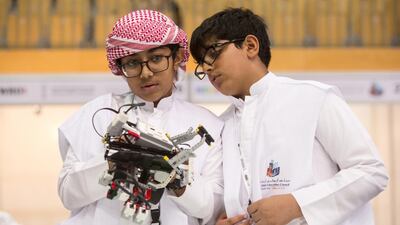Young people in the UAE must rise to compete with the best talent from across the world if they are to land the jobs of the future, a new report says.
Prepared by the British Council, Future Skills – Supporting the UAE's Future Workforce examines the challenges and opportunities in a rapidly changing world of work shaped by increasing automation and artificial intelligence.
To succeed in this environment, the next generation of Emirati workers will need to embrace the Stem skills – science, technology, engineering and maths – and improve their English, the report says.
In particular, the country’s reputation as a global centre of excellence means local job seekers “will have to have skills at the highest level”, said Gavin Anderson, the British Council’s director for the UAE.
The aim of the report is to show what is needed “for the UAE to achieve the very high ambitions it has set itself”, Mr Anderson said.
In particular, the report sets out to examine the employers’ perspectives, and their relationship with the education system and the public sector.
“Comments from chief executives of major companies suggest this needs to be focused on encouraging the early adoption of skills that provide a gateway to Stem subjects,” the report says.
“It also suggests that proficiency in multiple languages, including English, equips young minds with the capacity to flourish in these subjects.”
Three of four organisations surveyed stressed the importance of Stem-related qualifications, the British Council notes.
“This will prove a challenge for the UAE as executives highlighted that UAE graduates lack technical skills and essential skills like analytical capabilities, communications, core technology skills, critical thinking, collaboration and working in teams, and the English language,” the report says.
Deficiencies in learning English are “costing the graduates and the state time and money”, it says.
Students who fail their high school English test must take a foundation year in the subject before going to higher education, a programme that uses up a third of the post-secondary school budget and cuts into funding for other areas, the report notes.
It had been previously announced that improvements in English teaching would lead to the scrapping of the foundation year by 2012. As the report notes, six years later it is still in place.
Dr Yasar Jarrar, the author of the report, said that in the past two years there had been significant efforts to change attitudes to skills and education in the UAE in a post-oil economy.
He pointed to remarks by Sheikh Abdullah bin Zayed, Minister of Foreign Affairs and International Co-operation, last year in which he warned young people that the era of “comfortable” government jobs was coming to an end.
Dr Jarrar also referred to a speech by Sheikh Mohammed bin Zayed, Crown Prince of Abu Dhabi and Deputy Supreme Commander of the Armed Forces, who singled out engineering, saying: “We cannot have enough of it.”
________________
Read more:
Sheikh Abdullah tells UAE youth to think beyond ‘comfortable’ jobs
________________
Evidence shows that many public sector posts are particularly vulnerable to automation and AI, and could disappear in significant numbers even in the near future.
By talking to employers about what they are looking for, “our research was very clear”, Dr Jarrar said. “Stem, technical skills and language skills are a priority.”
What was encouraging he said, was evidence from other surveys of a rising acceptance of a career in the private sector among younger Emiratis.
The report says the UAE has one of the most rapidly improving education systems in the world, but students are still well below average for other advanced economies in subjects like maths, reading and science.
“Anecdotal evidence from the job market demonstrates that graduates today also lack essential skills like critical thinking, creativity, teamwork and the ability to work under pressure,” it says.
With six out of 10 people in the UAE under the age of 29, and half of those under 15, education and employment will top the policy agenda for “decades to come”.
Initiatives such as Vision 2021 and the Emirates Mission to Mars show the Government’s determination to bring change and to inspire the young people of the UAE to broaden their horizons, Dr Jarrar said, and talking about what needs to be done “is part of the past”.
“Change is happening in the UAE now.”


